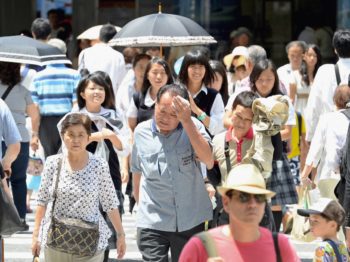
A media article summarizing the paper and its claim appeared at the very top of a Google News search for “global warming” on May 30.
The claim, however, is refuted by recorded temperature data.
The authors of the alarmist paper devised a computer model that concluded a summer heat wave would have almost no chance of getting as hot as last July’s Japan heat wave in the absence of global warming.
The model did not rule out that natural extreme summer heat waves could occur, and found natural factors were a significant factor in the July 2018 heat wave.
However, the model was programmed to add an extra layer of heat, due to global warming, to summer heat waves.
Alarmists can always add 1 degree Celsius – or whatever their latest claim is regarding the extent of human-caused global warming – to any temperature record and claim global warming is responsible.
For a high-temperature record, alarmists can tack on that 1 degree Celsius and claim the full extent of the high-temperature record would not have occurred without global warming.
But historical temperature records defy that simple, lazy approach.
Climate scientist John Christy showed in his 2016 congressional testimony that the number of high-temperature records in the United States peaked in the 1930s and has been steadily declining ever since.
It would be an amazing coincidence if U.S. high-temperature trends somehow defied global trends for all of the past 80 years.
Indeed, scientists with the Nongovernmental International Panel on Climate Change have shown little or no evidence for an increased frequency of summer temperature records globally.
Anthropogenic global warming theory itself predicts that most of the temperature impact of human-caused warming will occur during winter and in nighttime temperatures.
As a result, the lazy practice of adding 1 degree Celsius to all summer high temperatures should really be adding just a fraction of one degree Celsius if people want to take that lazy route.
However, objective data show the frequency of high-temperature records has declined or, at worst, remained unaffected since the early 20th century.
So claiming global warming must have been responsible for Japan’s July 2018 high-temperature records defies objective data trends.
Read more at CFACT















So the temperature increase (if there really is one) will occur mostly at night so the entire daily average temperatures increase by ~1°C. First time I read that. But Makes sense considering the greenhouse gases capture the radiation being released and re-emitted from the ground, and that doesn’t happen during the day. The sunlight is being absorbed by everything during the day, and then released (things cool down) at night.
I have read that before about night time temps not getting as cool. That does not sound so bad does it? Lots of vegetables grow better when the lows are warmer and few negatives for that.